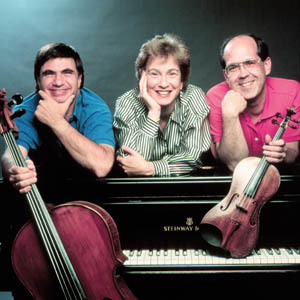![[Metroactive Music]](/music/gifs/music468.gif)
[ Music Index | Santa Cruz Week | SantaCruz Home | Archives ]
Rock Me Amadeus: The Amadeus Trio performs Sunday, Feb. 6, at the UCSC Music Recital Hall.
A Trio by Any Other Name
Timothy Baker lucked into use of the name Amadeus for his trio--and has used it as a springboard into international renown
By Scott MacClelland
Ever wonder how long it takes for your old phone number to be assigned to a new subscriber? A lot longer than it took violinist Timothy Baker to capture the name Amadeus for his trio. In the business of classical chamber music, that name alone is magic. Before the Amadeus Trio, it belonged to the Amadeus Quartet, the legendary Austrian string quartet that held ascendancy of field between 1948 and 1987, when it disbanded after the death of founding violist Peter Schidlof.
When Baker learned that no one had yet claimed the famous Mozartian moniker, he grabbed it on behalf of the trio he founded in 1986.
In the mid-1990s, Baker's original colleagues had bolted; finding himself all alone with committed dates at the Grand Canyon Chamber Music Festival, he contacted two highly regarded and experienced chamber players, the pianist Marian Hahn and the cellist Jeffrey Solow, who were colleagues already. The three have played together ever since.
Today, the Amadeus Trio is at the top of its game, an all-American triumvirate with a worldwide, world-class reputation. In recent years, you may have heard them at Stanford, in San Jose and Half Moon Bay, or on NPR's Performance Today.
For its appearance this Sunday at UC�Santa Cruz, Amadeus offers three masterpieces: the underexposed Trio in C by Gaspar Cassado, Shostakovich's towering Trio in E Minor, op. 67, and Mendelssohn's Trio in C Minor.
Cassado was a renowned cellist, composition pupil of Ravel and de Falla and teacher of Pablo Casals. Shostakovich's Second Trio begins with a fugue in the cello's stratosphere--the "rosin register" cellists call it--so that when it enters, the violin is suddenly the low string voice. Composed in 1944, it laments the destruction of Leningrad and the loss of close personal friends during the war. The finale features a hair-raising dance of death. The work achieves a profundity of expression as well as compositional technique.
Ending a piece with a chorale has proven to be an effective way to achieve both resolution of what's gone before and set an uplifting tone for performers and listeners alike. J.S. Bach, of course, made the most of the device, primarily in his "chorale" cantatas. The same technique, used strictly and/or freely, appears in Beethoven's Ninth Symphony, Brahms' Alto Rhapsody, Mahler's Um Mitternacht, Berg's Violin Concerto and Honegger's Second Symphony. Mendelssohn invokes Lutheran chorales in the finales of his Reformation Symphony and C Minor piano trio. (In the latter, the tune itself first appeared in print in the Geneva Psalter of 1562, and was used by Bach in his cantata 130, Herr Gott, Dich furchten alle wir.) Solow says Amadeus plays this great piece often in part because it is usually overshadowed by Mendelssohn's popular Piano Trio in D Minor.
Baker plays the "Guitar" Strad, made in 1718. Lacking typical violin corners, it is apparently the only survivor of four Stradivari violins with a guitar look. Solow's cello dates from circa 1902 and was made by Gaetano Sgarovotto, founder of the formally named Cremona Violin Making School.
Affiliated with Temple University, the Amadeus Trio has added to its repertoire new works by Ellen Taaffe Zwilich, Seymour Barab, William Eaton (who also makes unique guitars), Paul Chihara, Frederic Charleton and David Ott. "None are far out," says Solow, "they use traditional musical language."
Copyright © Metro Publishing Inc. Maintained by Boulevards New Media.
For more information about Santa Cruz, visit santacruz.com.
![]()

Photograph by Steve J. Sherman
The Amadeus Trio performs Sunday, Feb. 6, at 7pm at the UCSC Music Center Recital Hall. Tickets are $27/$23, $23/students and seniors with ID, $15/UCSC students with ID. (831.459.2159)
From the February 2-9, 2005 issue of Metro Santa Cruz.